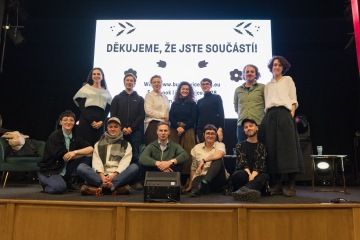(PERMA)CULTURAL FORUM: The year of rooting has begun for České Budějovice 2028
Last week, the annual programme conference of České Budějovice - European Capital of Culture 2028, (PERMA)CULTURAL FORUM, took place. The central theme of this year's two-day conference was sustainability. On the occasion of the forum, a memorandum of cooperation was concluded with the Broumov Foundation - City of Culture - the second finalist for the title of European Capital of Culture.
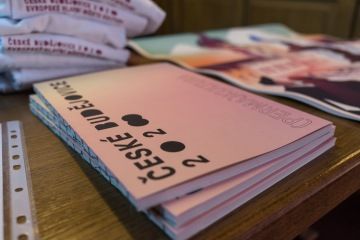
2024 is the Year of Rooting. In our view, creating strong roots and a connected mycelium promotes a sustainable cultural environment. Therefore, SUSTAINABILITY is also a key theme for České Budějovice 2028. The aim of the forum was to focus on sustainability through the lens of the 3 areas of the winning ECoC bid - CARE, CONNECTING and CREATING, by showcasing the best domestic and international cultural practices.
This year's edition of the (PERMA)CULTURAL FORUM was divided into two days - the first day was dedicated to the speaker panels - sustainability as care, connection and creation. The second day followed the panels with practical workshops.
The conference welcomed distinguished guests and speakers from the national and international scene - featuring leading experts such as Shawn Antoni Wright (The Penguin Project, Trans Europe Halles network), Stefan Teisanu (Cluj Cultural Centre, Culture Next network) and Laura Welzenbach (Ars Electronica Festival).
SUSTAINABILITY AS CARE
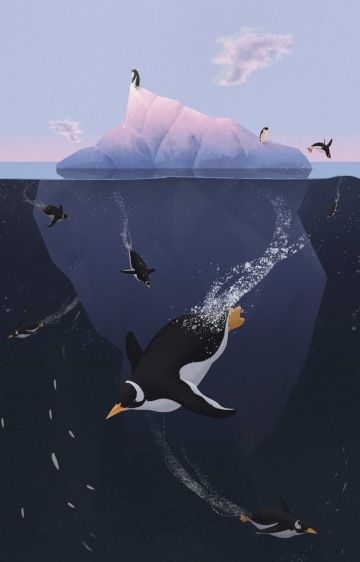
The conference opened with a session entitled "Sustainability as Care". What conditions does the cultural sector need to thrive in the long term? What challenges do cultural organisations face today? Is care a fundamental principle of sustainable organizational functioning or a superstructure?
The first speaker was Shawn Antoni Wright from The Penguin Project and the Trans Europe Halls network. How not to lose your passion when working in independent cultural centres? Wright's talk introduced The Penguin Project and its tools and methods to help cultural workers answer this question. This international project was created at the Innsbruck cultural centre Die Bäckerei - Kulturbackstube, which takes a caring approach to the organisation's team, the community of visitors and audiences, and the environment.
The Penguin Project doesn't just have a penguin in its name by chance. It serves them as a very concrete metaphor for how the (work) environment determines how much we can manifest our innate potential. They point to a penguin that moves on ice - clumsy, heavy in contrast to the agile, fast and graceful penguin in the water. In other words, depending on the context, we are either fighting or swimming. If the context supports our qualities/abilities, we can move effortlessly; if not, our journey is difficult.
The second speaker was Petr Dlouhý - curator and creative producer in the field of independent performance art. Since 2021 he has been a member of the artistic team of Studio ALTA, where he is responsible for creating new formats of making institutions accessible to specific target groups and for educational activities aimed at developing artistic practices.
Dlouhý presented several very specific examples of care that he deals with in Studio ALTA. He talked about setting a healthy environment in cultural organizations that care about interpersonal relationships.
Studio ALTA has been active on the cultural scene since 2028. It was established in Prague's Holešovice as a space for the creation of dance and physical theatre. Over time, the studio has grown into a multicultural centre and creative hub that connects artists, the public and diverse communities. In 2023, they opened a new facility in Libeň, in the former Pansky Brewery building.
The last speaker of this session was Pavla Semeráková, Head of Education at the Maiwald Academy in Broumov, who discussed the topic of Sustainability as Care from an environmental perspective. The Benedictine legacy of sustainable living has been developing in Broumov for many years. Petra also runs the Lapidarium Children's Gallery, where together with artists, curators and lecturers she brings contemporary art to children. Her main interests are art, education and working with audiences.
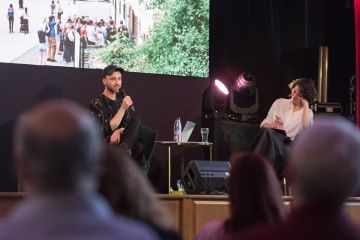
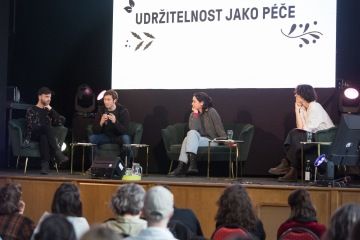
SUSTAINABILITY AS A CONNECTION
How far do our relationships go? How do quality partnerships contribute to long-term sustainability and continuity? How do we create and nurture long-term partnerships? How to create synergies?
By deciding to enter the competition for the title of European Capital of Culture, each city commits itself to investing considerable funds, time, energy and creativity of many people into the project during the candidacy phase. To ensure that such an investment is perceived as sustainable from the outset, even if the city does not win the title, it is necessary to create quality partnerships from the start. Cultural manager Stefan Teisanu, director of the Cultural Centre of Cluj, knows all about this. Although the title for 2023 in Romania was awarded to the city of Temesvár, Cluj implemented most of the projects it applied for. At the same time, Cluj has initiated the creation of the Culture Next network, which creates synergies and opportunities for cooperation between ECoC candidates, winners and losers. Both České Budějovice and Broumov are part of this network.
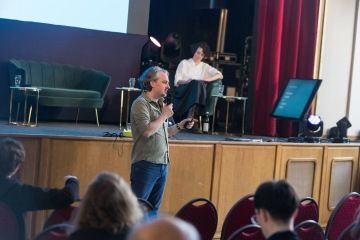
We are very happy that we could welcome also representatives of the Broumov 2028+ team Maria Silondi, Pavla Jenkova and Žaneta Vávrová. How to build long-term relationships with different groups of people and why do we need to care for them tirelessly? Members of the team that prepared the candidacy came to give us their experience (not only) from Broumov's candidacy for the title of European Capital of Culture. Marie Silondi led and coordinated the candidacy, Pavla Jenková was in charge of public involvement and Žaneta Vávrová, as director of the Broumov Educational and Cultural Centre, deepened relations with international partners. All of them continue to work for the Broumov region and develop what was started thanks to the candidacy.
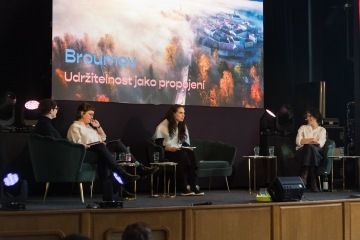
The REZI.DANCE Centre in Komařice, South Bohemia, is the first residential house for live art in the Czech Republic. It is also proof that residency can take many forms. It is a place and time for stopping, resting, researching or, on the contrary, creating and concentrated work. The director of REZI.DANCE, Markéta Hrdlička Málková, spoke about the equal importance of solitude and meeting, about establishing relationships with artists and the local community, and about the importance of networking. Markéta is a member of several grant committees and a member of the dramaturgical board of the Czech Dance Platform and New Blood on Stage. Since 2023, she has been the chair of the industry organization Vision of Dance.
Last November, the Cultural and Creative Federation was established. Its aim is to unite the cultural and creative sector, represent its interests and be a transparent channel of communication with the public administration. The KKF wants to cooperate with associations, cultural institutions, non-profit organisations, public administration, cultural and creative industries or companies using their services. It wants to be a commenting point within the inter-ministerial commenting procedure, coordinate the cooperation of members, participate in European initiatives, map global trends and provide professional background for effective support of the Czech cultural and creative sector. Jakub Bakule, President of KKF and specialist in the cultural and creative sector, spoke about building relationships across the sector.
SUSTAINABILITY AS CREATION
Are we aware of the environmental impact of our work and what the consequences may be? What is the potential for our work to have a positive impact not only on the environment in which we create, but also on the people who live there? Can we start doing things differently from one day to the next? How do we communicate change? How to set an example? And why not stop creating at the same time?
Laura Welzenbach, Head of Ars Electronica Export, presented the dynamic sphere of the organisation behind the Ars Electronica Festival in Linz, its strategic focus and orientation towards sustainable festival practice. The starting point of this journey was 2009, when Linz became European Capital of Culture. As head of Ars Electronica Export, Laura creates experiences through the connection of art and science. In the past, she has led an artist residency program at Eyebeam in New York, was the executive manager of the sound:frame festival in Vienna, and worked with arts organizations such as the Guggenheim Museum and the Austrian Cultural Forum in New York.
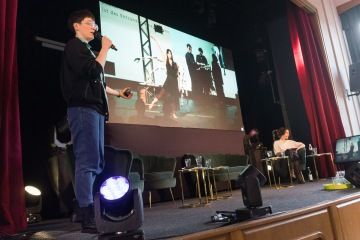
The Circular House is one of the projects that are part of České Budějovice's application for the European Capital of Culture. The Circular House builds on the long experience of the KABINET CB re-use centre in České Budějovice and combines the principles of environmental sustainability and social entrepreneurship. At the same time, it creates to some extent a service, technical and production facility for the activities of the ECC and other cultural organisations. The project was presented by its curator Dana Kalistová. Dana is also the chairwoman of the Czech Federation of Furniture Banks and Re-use Centres.
In a world full of changes and challenges, creativity is not only an artistic skill, but above all one of the key competences for a sustainable future. Creativity, together with creative and critical thinking, are the tools that allow us to adapt to today's challenges and innovate for a better future. The Creative Minds project encourages the development of creativity and critical thinking in children from an early age and makes them true creators. The project encourages the skill of looking for new possibilities and opportunities, promotes interdisciplinarity and teaches children to work with modern technologies in a creative way. It leads children to collaborate and teaches them to approach complex topics from different perspectives and points of view. Its curator is Tomáš Novotný, a lecturer, curator and creative who has spent the last ten years at the largest children's gallery in the Czech Republic - the Sladovna Gallery in Písek, where he also headed the education department for several years. Together with the methodologist Lucie Marková, Tomáš is now preparing a platform for creative education for the South Bohemia region.

Memorandum of Cooperation
As part of the (PERMA)CULTURAL FORUM České Budějovice 2028, z. ú. concluded a memorandum of cooperation with the second finalist of the competition, the Broumov - City of Culture Foundation. The cooperation will bring synergies in the implementation of the ECC objectives in the national and international area, especially at the level of cultural and artistic programme, but also cultural strategy, marketing and PR, tourism, creative education and public relations.
